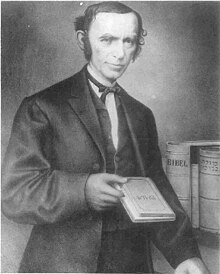David Einhorn (rabbi)
| David Einhorn | |
|---|---|
 |
|
| Born |
November 10, 1809 (2 Kislev 5570) Diespeck, Kingdom of Bavaria |
| Died | November 2, 1879 (aged 69) (16 Cheshvan 5640) New York, New York, United States |
| Education | University of Erlangen-Nuremberg, University of Munich, University of Würzburg |
| Occupation | Reform rabbi |
| Parent(s) | Maier and Karoline Einhorn |
David Einhorn (November 10, 1809 – November 2, 1879) was a German rabbi and leader of Reform Judaism in the United States. Einhorn was chosen in 1855 as the first rabbi of the Har Sinai Congregation in Baltimore, the oldest congregation in the United States that has been affiliated with the Reform movement since its inception. While there he created an early American prayer book for the congregation that became one of the progenitors of the 1894 Union Prayer Book. In 1861, Einhorn was forced to flee to Philadelphia, where he became rabbi of Reform Congregation Keneseth Israel. He moved to New York City in 1866, where he became rabbi of Congregation Adath Israel.
He was born in Diespeck, Kingdom of Bavaria on November 10, 1809, to Maier and Karoline Einhorn. He was educated at the rabbinical school of Fürth, where he earned his rabbinical ordination at age 17. He then studied at the universities of Erlangen, Munich and Würzburg, where he studied from 1828 to 1834, supported by his mother following the death of his father.
He was a supporter of the principles of Abraham Geiger, and while still in Germany advocated the introduction of prayers in the vernacular German, the exclusion of nationalistic hopes and the restoration of the Temple in Jerusalem and the sacrificial services there from the synagogue service, and other ritual modifications, lobbying on behalf of these changes at the 1844 Frankfurt Assembly. He was chosen Landesrabbiner of the Birkenfeld at Hoppstädten, and afterward Landesrabbiner of Mecklenburg-Schwerin in 1847, succeeding Rabbi Samuel Holdheim whose views were a major influence on Einhorn. An incident in which he blessed an uncircumcised boy, which upset many of his more traditional congregants, led to his departure from Germany. He was called to Pest, Hungary in 1851 where his views met with such opposition that his temple was ordered closed only two months after his arrival there by the Emperor of Austria, who saw a connection between the Jewish reform movement and the Revolutions of 1848.
...
Wikipedia
